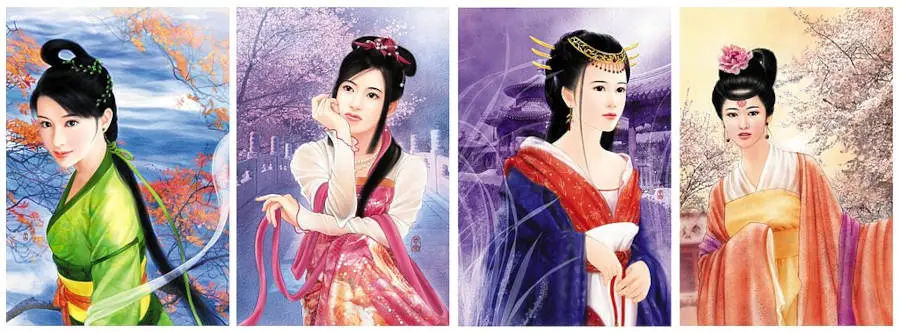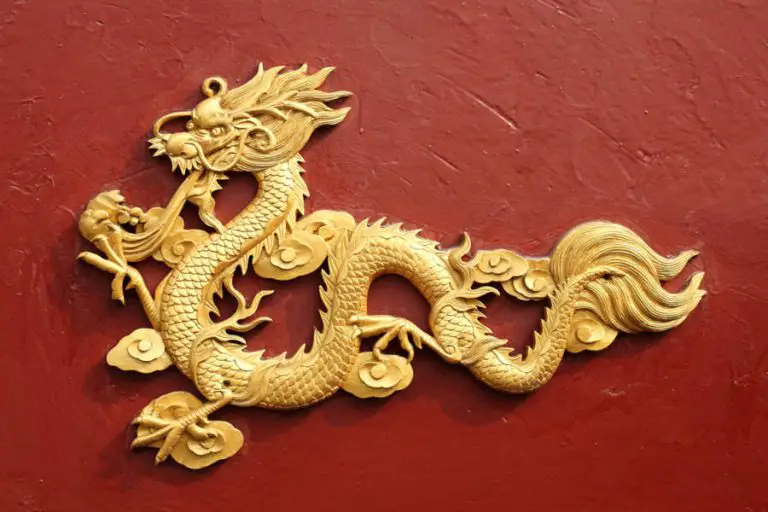In the previous article, we saw the stories of the first two great beauties: Xi Shi and Wang Zhaojun. If you haven’t read it click here to check it out. In this article, we will look at the stories of the other two (Diao Chan and Yang Guifei), take a look at some beauty flaws they had and how they manage them, and finally some of their beauty secrets.
Diao chan (貂蝉) (Three Kingdoms Period, 220 – 280 CE)
Diao Chan was so beautiful that if the moon saw her, it would hide in shame. Diāochán bì yuè (貂蟬閉月)
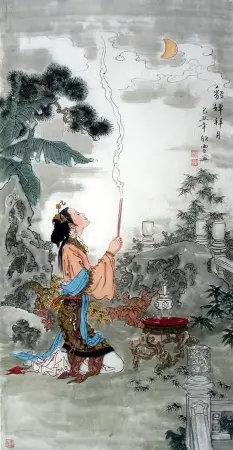
Diao Chan 貂蟬 is the only Great Beauty who has no historical records. She became a legendary figure after being portrayed as a heroic figure in the “Romance of the Three Kingdoms,”(Aff.link) a famous work of Chinese literature.
Depending on the source, it was said that Diao chan was born in either 161 or 169 AD. She was born in the village of Mu’er in the county of Bingzhou in what is now the province of Shanxi.
Diao Chan, according to the story, was the adopted daughter of Han minister Wang Yun. When she was fifteen, she was chosen to work as a serving maid in the Han Court, where she was tasked with maintaining the Diao chan, or hat decorations, worn by court officials. As a result, she became known as such, although her true name remained unknown throughout history.
The Han Dynasty ended with the death of Han Emperor Ling in 189 CE. Three warlords arose to become equally powerful, starting in the period of history known as the Three Kingdoms.
Eventually, one of the warlords, Dong Zhuo, with the assistance of his adopted son, Lü Bu, a formidable young warrior, gained the upper hand by assassinating the child emperor and installing one of his choosing, with Dong Zhuo as prime minister. Dong was a cruel monarch while being a prime minister on paper.
Diao Chan’s father saw the warlord Dong Zhuo take advantage of the Emperor and treat the people of China in general like he was a total dictator. Wang Yun wished to see Dong Zhuo destroyed. Dong, on the other hand, was invincible with Lü Bu as his bodyguard.
Wang Yun started to lose sleep over this problem, and his health got worse. According to legend, Diao Chan became concerned about her father’s situation and one night went out to the garden to pray to the moon goddess, promising to do anything she could to assist her master. The moon suddenly moved away and was hidden by clouds. It seemed to be looking at Diao Chan and feeling a little shy because of how beautiful she was.
In the saying “Beauty that outshines the moon and shames the flowers,” Diao chan is the subject of the phrase “outshines the moon.”
Wang Yun heard her prayer, and he decided to make Dong Zhuo and Lü Bu fight each other so they would be weak. He told Diao Chan to do this.
Wang Yun then engaged Diao chan to Lü Bu while also presenting her as a concubine to Dong Zhuo. The strategy worked. Dong Zhuo and Lu Bu both developed feelings for her and couldn’t determine how to proceed.
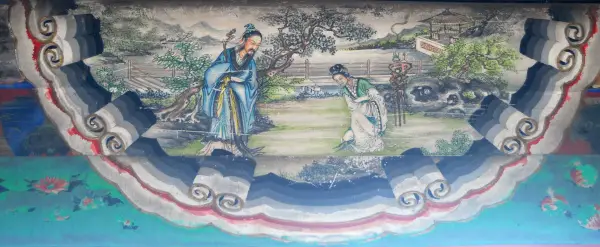
Lu Bu became enraged with Dong Zhuo when the latter saw him with Diao Chan, who was weeping crocodile tears because she was to be separated from the man she claimed was her real love. As the conflicts escalated, the two men developed ferocious jealousies for one another, and Diao chan seized every opportunity to pour gasoline on the flames. Eventually, Dong Zhuo was killed by Lü Bu, liberating China from one of the most despotic rulers in history.
Lü Bu got Diao chan, who liked him, and started living as a fugitive because he was wanted for murder. Diao chan fought alongside him in numerous battles until Cao Cao captured and killed Lü Bu. Readers of The Romance of the Three Kingdoms will never know what happened to Diao chan after that. However, there are some speculations about her death.
Diao chan’s End
There is an old story that says Cao Cao captured Diao chan after Xiapi. To keep Guan Yu in his service, Cao Cao ordered Diao chan to seduce him. Guan Yu felt he was being deceived since he knew how she had deceived Lü Bu and Dong Zhuo, so he murdered her to prevent her from hurting anybody else.
A second version of this story says that many years after Xiapi, Liu Bei, Zhang Fei, and Guan Yu all wanted to marry Diao Chan, and they fought very hard over her. Guan Yu cut her in half to stop the fighting between them.
In one Yuan Dynasty drama, Diao chan is brought to Guan Yu by his sworn brother Zhang Fei after the death of Lü Bu, but instead of taking her as war booty, Guan Yu beheads her with his sword. This event doesn’t show up in history books or in the novel itself. Instead, it’s spread through operas and other forms of mass media.
Another theory about what happened to Diao chan is that she did meet Guan Yu, but he allowed her to become a nun. When Cao Cao heard this, he wanted to make her his own. However, when the news reached Diao chan, she committed suicide.
According to Chinese historical records, the warrior Lü Bu had an affair with one of the warlords Dong Zhuo’s maids. He was afraid that Dong Zhuo would find out, so he never told him about it. This was one of the reasons he deceived and murdered Dong Zhuo in 192. The maid’s name, however, was never mentioned in history. Diao Chan’s true identity was never revealed, despite the fact that she had already completed her task. But, given that Wang Yun was subsequently assassinated by Dong Zhuo remnants, it didn’t appear like she would live.
Keeping the Memory of Diao chan
According to Meng Fanren’s textual investigation, Diao chan is a historical figure. Her original name was Ren Hongchang 任红昌, and she lived in Muzhi village, 3 kilometers south of Xinzhou city in Shanxi Province. A stele with the words “Diao chan’s Hometown” as well as her grave and shrine can still be found in the village. They were created to honor this honorable woman who gave her life for her nation.
Related reading: The Most Powerful Women in Ancient China – Opens in new tab
Yang Guifei (杨贵妃) (Tang Dynasty, 618 – 907 CE)
When Yang Guifei passed by, all the flowers hid away in embarrassment. Guìfēi xiū huā (貴妃羞花)
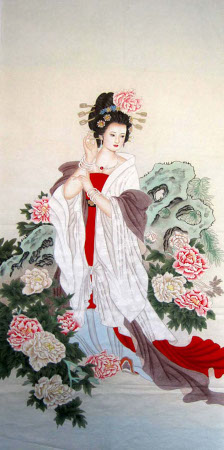
Yang Yuhuan 楊玉環 is the last of the four beautiful women. As a prominent lady in ancient China, she is often overshadowed by her ancestor/great-grandmother Wu Zetian, despite being more beautiful. Her face was thought to be more beautiful than any flower.
Yang Yuhuan, also known as Yang Guifei 楊貴妃, allegedly lived during the Tang Dynasty. She was born into a long-established and well-known official family.
She was stunningly beautiful and had a kind personality. She had talent and training in music, singing, dancing, and lute playing, as well as in reading and communication.
Yang Yuhuan was also noted for being somewhat overweight, which was a highly desired characteristic at the time. However, if a chubby woman is reported to have made flowers turn away in shame when she approached them, then the legend should have something to say about her attractiveness.
Consort Yang was frequently compared to Empress Zhao Feiyan, the lovely wife of Emperor Cheng of Han because Consort Yang was renowned for her full build while Empress Zhao was known for her thin form. This gave rise to the Chinese proverb “Huanfei Yangshuo” 環肥燕瘦, ( literally “Plump Huan, Slender Fei”), which represents the variety of beauty styles.
Once, she went to the palace garden with the maidservants to look at the flowers. By accident, she touched a mimosa, and its leaves rolled up right away. The maids said that Yang Yuhuan’s beauty caused the flowers to rolling up. After that, Yang Guifei’s exquisite moniker was “ashamed flower.”
She started out as a Daoist nun, taking the name Taizhen 太真. Later, she worked as a concubine servant in the home of the emperor Xuanzong. The Emperor fell in love with her and took her as his concubine. In 745 CE, he gave Yuhuan the title “Guifei,” which means “First Lady.” This made her his favorite woman at his court, which made many of his other concubines sad. Thereafter, Yang Yuhuan would be referred to as Yang Guifei.
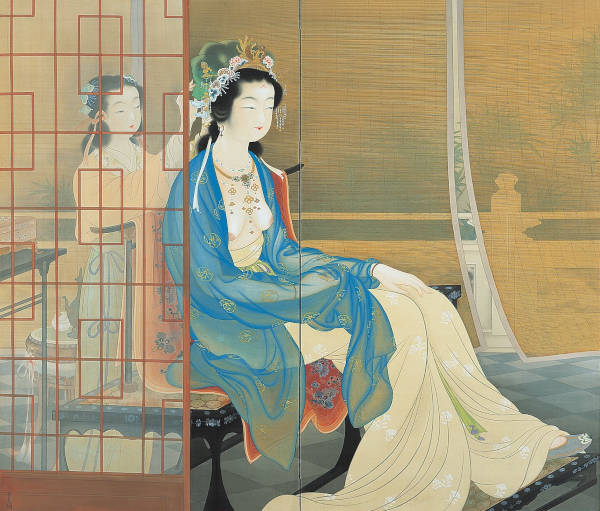
He mostly avoided the more typical mistakes of those who were seduced by that level of attractiveness. But even so, it was these choices that led to his downfall. With her close relationship with the emperor, Yang Guifei was able to secure prominent positions in the government for her relatives. So, she was able to convince him to make Yang Guozhong, her cousin, the leading chancellor.
An Lushan, a general officer in the Tang military system, was another person who used her power. At first, he seemed like a good person with a bright future.
An Lushan finally gained enough power to begin his own rebellion, the “An Lushan Rebellion,” in 755 CE. The rebellion began with the goal of getting rid of the corrupt government of Yang Guozhong, who was the Prime Minister and Yang Guifei’s cousin.
During this rebellion, many people died, and when the rebel army moved toward the capital, the emperor and his courtiers had to escape from Chang’an, the capital, to Chengdu, accompanied by an army.
When they approached the Mawei Slope village, the troops, and officers refused to continue. They claimed that this was all Yang Guifei’s fault because she was a bad influence on the Emperor and because An Lushan wouldn’t have had enough power to start this bloody rebellion without her. In a manner similar to how Xi Shi and Diao Chan brought down King Fuchai and Dong Zhuo, she destroyed Emperor Tanzhong.
And because of this, they requested the execution of Prime Minister Yang Guozhong and his cousin, Yang Guifei, blaming them for the difficulties that had tormented the kingdom. The emperor had no option but to give in to their demands, despite the fact that he adored Yang Guifei and knew she was being used as a scapegoat for the Prime Minister’s actions.
Emperor Tang Xuanzong had no alternative but to order Yang to kill herself, and the devastated Yang Guifei hanged herself with a white scarf at the Mawei Slope.
Yang Guifei was eventually portrayed as a sad person. Bai Juyi was one of the best-known poets of the Tang Dynasty. In 806, he wrote “Song of Everlasting Sorrow,” a long poem about how much Emperor Xuanzong loved Yang Guifei and how sad he was that she had died. For thousands of years, the poem was one of the most commonly read Chinese love poems.
The poem and the Yang Yuhuan narrative both gained enormous popularity in Japan and were the basis for the famous novel “The Tale of Genji,” which opens with the tragic love story of an emperor and Kiritsubo, a consort who is compared to Consort Yang.
Keeping the Memory of Yang Guifei
In remembrance, a white marble statue of Yang Yuhuan stands in front of her tomb in Xingping, Shaanxi.
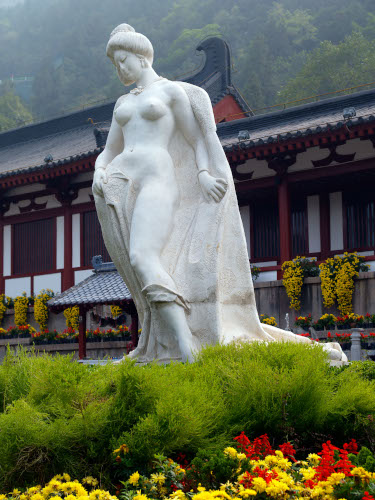
The Four Great Beauties’ Beauty Flaws
They were gorgeous, but they also had defects. How did they then overcome these deficiencies?
- Xi Shi’s flaw is that she has large feet, which were highly harmful in ancient times when little feet were considered lovely. To hide her big feet, she made the skirt longer and made customized higher clogs. The shoes were high, so the skirt covered them. Additionally, she wore bells around her waist, delicately moving the lotus steps, and clinking. This design made people’s eyes move from their feet to their waists as they walked by.
- Wang Zhaojun has sloping shoulders. As a result, she used to wear outfits with shoulder pads to disguise her drooping shoulders. At the same time, she often wore cloaks to cover up her defect.
- Diao Chan’s flaw is that his earlobe is too small. Diao Chan frequently wore spherical earrings with a single huge gemstone since the earlobe was tiny and discordant with the face. Not only were the ear flaws invisible, but the ears were also slender.
- Yang Yuhuan’s flaw, was body odor. Yang Yuhuan persuaded Xuanzong to create the Huaqing Pool solely to cover up the bodily odor. She bathed numerous times a day, and every time she ordered the court women to add flowers and spices to her bath.
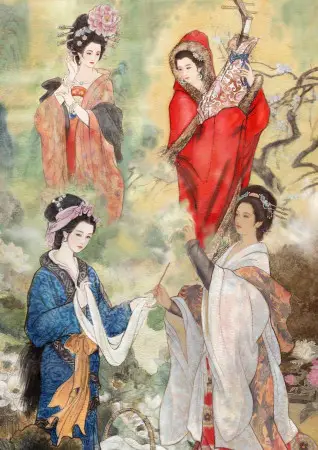
The Beauty Secrets of the Four Great Beauties
- When bathing in the hot springs, Concubine Yang used the patting method, patting her entire body with her hands. The Tang Dynasty took over the traditions of the Northern Dynasty and built a hot spring palace. Huaqing Pool is the most famous place there. According to tradition, hot springs have the power to ward off bad spirits and keep illnesses at bay.
- Yang Guifei frequently bathed in the hot springs with peony peel, mulberry leaves, and nettle. When put in water, they can calm nerves, speed up skin regeneration, and make skin smooth and soft.
- Mistress Yang kept her skin looking bright and young by mixing goji berries, almond oil, and honey into her own skin cream.
- Lychee fruit is supposed to have been used in her hot spring bath. Lychee is high in protein, vitamins B and C, phosphorus, and iron, all of which help moisturize her skin.
- The peach blossom mask. It is made by crushing dried peach blossoms into a fine powder-like texture and then combining it with the blood of a black chicken. This mask was claimed to hydrate and whiten the skin while also increasing metabolism.
- Chinese women have long paid close attention to their brows because they think it is related to their fate. During the Warring States Period, ladies painted their eyebrows with ashes from burning willow branches.
- Another sort of brow makeup was created by grinding dai, a blue mineral, into powder and mixing it with water.
Related reading: Finding Personal Growth Lessons In Ancient Chinese Tales – Opens in new tab
An Introduction to Chinese History & Culture (Aff.link)
Dive into China’s rich past and intriguing present! From ancient dynasties to modern powerhouses, uncover Chinese culture facts, pivotal moments, and the captivating tales that have shaped this vast nation.
Stay in Touch
 Join our newsletter by using the forms on this website or click here!
Join our newsletter by using the forms on this website or click here! Follow us on Google News
Follow us on Google News Follow us on Facebook
Follow us on Facebook
Featured image by Icemoon from Wikimedia Commons (CC BY 2.5)

